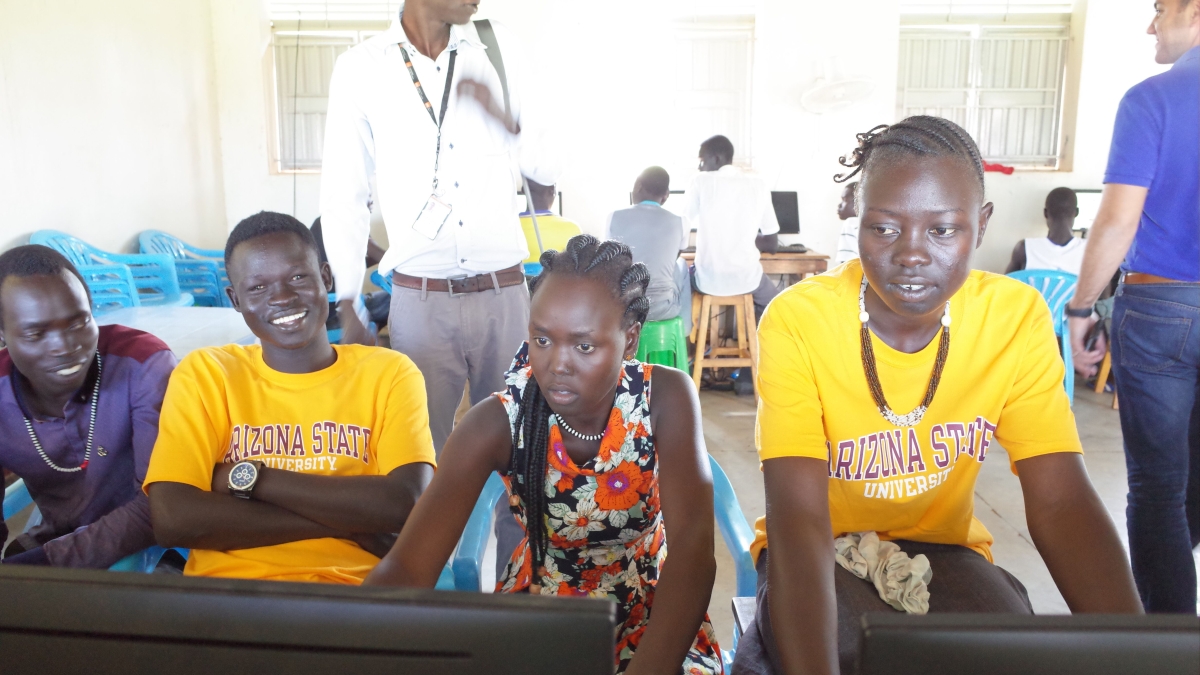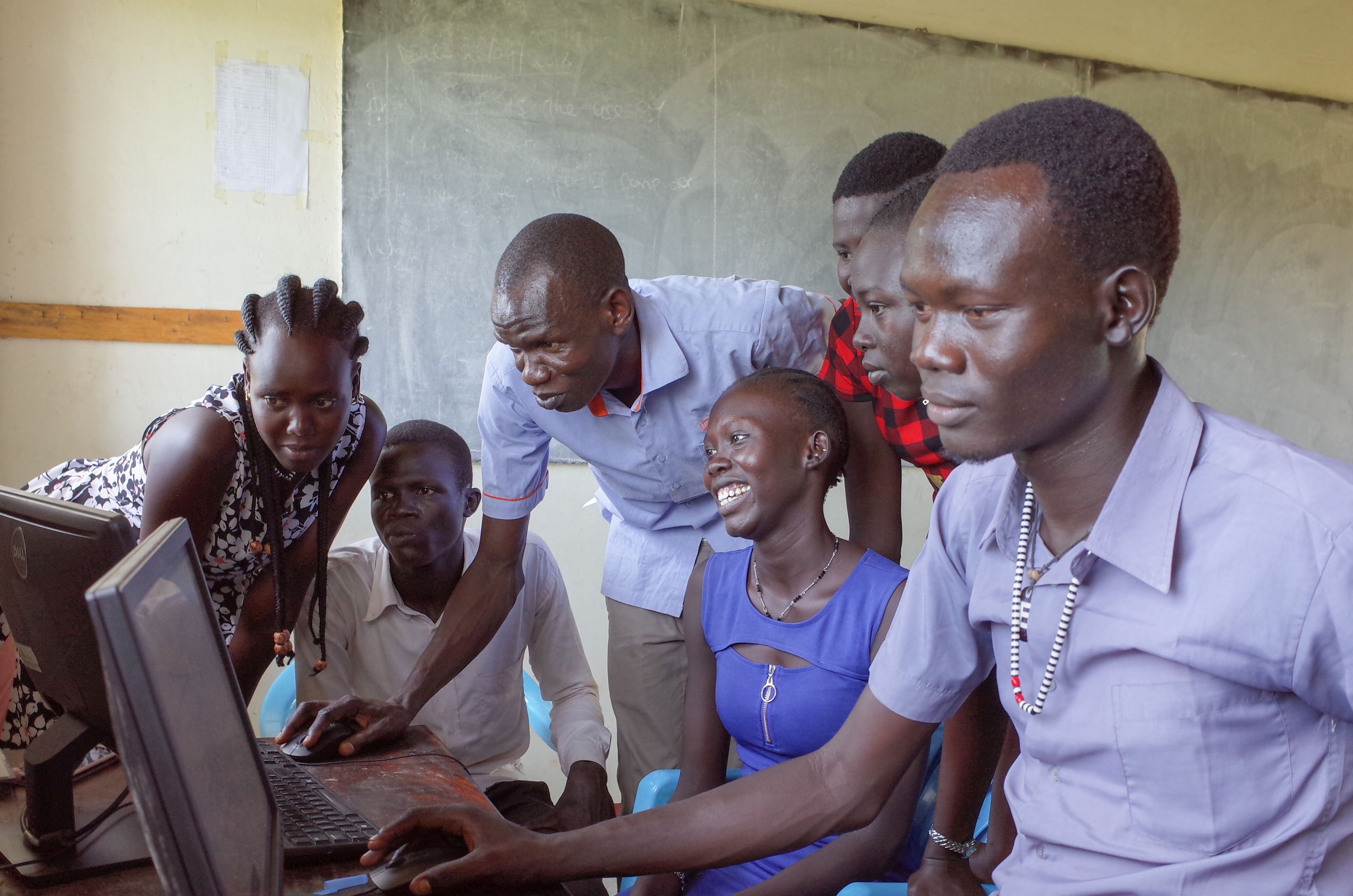ASU offering rapidly deployable online courses to refugees, displaced people

Editor's note: This story is being highlighted in ASU Now's year in review. Read more top stories from 2019.
Every day, more than 44,000 people are forced to flee their homes as a result of persecution, conflict or generalized violence. Millions cross borders into new countries seeking safety, bringing with them a determination to positively contribute to their new communities.
More than 85 percent of these refugees flee to developing countries, often without the ability to continue their education or get jobs. Restricted to a refugee camp or trying to make ends meet in an urban center, many want to gain skills that will benefit them in their new communities and also when they return to their countries and rebuild.
Education for Humanity, an initiative of Arizona State University, is meeting that need by offering online courses to refugees in Lebanon, Jordan, Iraq, Uganda and Rwanda. Soon, the program will expand to Ethiopia and Kenya.
“Once food and shelter are handled, often the next concern is, ‘How do I continue my education?’” said Nicholas Sabato, director of country programs for Education for Humanity. The initiative is managed by EdPlus, the unit at ASU that creates technology and forges partnerships to develop new ways of teaching and learning.
More than 68 million people are displaced around the globe, according to the United Nations Refugee Agency, and fewer than 1 percent have access to higher education.
Most refugee-education programs focus on primary schooling, according to Pamela DeLargy, senior adviser on international development initiatives in the Office of the President. She has worked with refugees for more than 20 years, most recently with the United Nations in Ethiopia, before coming to ASU last year to help advance Education for Humanity.
“They completely forget the young adults who are refugees or people who were already in college who had to flee,” said DeLargy, who is also a professor of practice in the School of Politics and Global Studies. “There are tens of thousands of these people who would be going to college if their home country was safe.”
With the first courses offered in fall 2017, Education for Humanity deliberately started small. In 2018, 422 learners took courses. But there have already been successes: Some of the program’s students were hired by international organizations after completing a few of the English-language courses.
“Overwhelmingly people see education as hope,” Sabato said. “In each setting, learners have responded extremely positively to this opportunity, demonstrating incredible commitment in engaging with the courses.”
Education for Humanity faces complicated challenges. Every country has different requirements for accreditation and many of the refugees live in areas with limited infrastructure and internet connection. Many refugees are so busy with the responsibilities of daily life that finding time for classes is difficult. Most have never learned online before. But ASU has been able to leverage its expertise and partnerships to deliver a variety of online coursework.
“Some learners engage with the intent to gain quick skills for employment and others see it as an opportunity to pursue a degree,” Sabato said.
Education for Humanity launched in Uganda last year, offering courses to refugees from South Sudan. Photo by Marc Alan Sperber/EdPlus at ASU
Most of the students are ages 18 to 35, and they typically learn in a room set up with several computers. Local teachers are hired as facilitators on site to help guide the students.
The course offerings are based on what the refugees and the local partner want, as well as the host countries’ policies toward refugees’ livelihoods.
“In the Middle East, English language offerings are paramount,” Sabato said. “In Uganda, it’s a bit different because there is so much more freedom for refugees to move and work and have access to different opportunities, so being on a degree pathway has been in high demand.”
Education for Humanity offers a course in how to successfully learn online and English-language courses from Global Launch as well as content from ASU Online. The program is developing “micro-credentials” in areas including teacher training and entrepreneurship to serve as the midway point between short-term skill development, like English courses, and a long-term degree pathway.
Sabato spends a lot of time working with partners in the host countries, such as humanitarian agencies and ministries of education.
“In a given trip, I meet with learners, refugee aid organizations, U.N. Refugee Agency representatives and host country government officers who determine which programs are allowed to run in the camp setting,” he said.
“I gather that information and bring it back for discussion. There is a lot of two-way communication between ASU and our program sites, determining which courses are of most value and how they can be offered appropriately.”
Coursework developed for western audiences must be contextualized for students in Africa and the Middle East, he said.
One of the biggest challenges is poor internet service.
“Even if there is connection, it’s often slow. It may work well for one person but is inevitably challenging for 25 people in a class,” he said. “If our courses have any media, like video or photos, it tends to cause delays so we had to tailor our content to make it low-bandwidth friendly.”
Education for Humanity is now working on partnering with SolarSPELL to deliver an agribusiness course to an unconnected refugee settlement in Uganda. SolarSPELL, a solar-powered, offline digital library that provides localized educational content, was invented by Laura Hosman, an associate professor in the School for the Future of Innovation in Society.
The courses are free for the refugees. Education for Humanity was launched two years ago with support from a private donor and matching funds from ASU.
“Without President Crow deciding that this was a worthy endeavor, this would never have happened at all,” Sabato said.
“Moving forward we’re looking at a mixed model of continued ASU operational support along with external funding from foundations and governments — U.S. and foreign — to support the project.”
A critical key for success is Education for Humanity’s partnerships with nongovernmental organization partners, such as the Norwegian Refugee Council, where ASU serves as the higher education provider in conflict-affected countries around the world.
“We’re seeking partnerships with like-minded humanitarian agencies around the world, through which we can complement their existing services with our educational offerings,” he said.
“We intend to be reflective of President Crow’s vision of a rapidly deployable higher-education option for crises as they emerge.”
Education for Humanity aims for gender parity among its students, but it’s a challenge.
“One of our programs in Amman, Jordan, was 80 percent female, which was quite unique. Of course, we were extremely pleased with that level of engagement,” he said. Most classes are around 40 percent female, and family responsibilities are often cited as reasons for dropping out of the courses.
“We’re trying to figure out flexible ways to keep them engaged and continuing the courses, like offering them at different times of the day or utilizing centers that have child care,” he said.
“Another component is having staff accompany them home from the center at night.”
While many Westerners perceive food, shelter and medicine to be the most pressing needs for refugees, education is critical for their future, DeLargy added.
“Almost half of the refugees in the world today have been refugees for more than 20 years,” DeLargy said. “There are refugee camps that are 30 and 40 years old. There are two or three generations of people who haven’t been able to go home.
“If you look at the Syrian refugees, it’s been five years now. You can’t stop education or you get a whole generation of people who are not literate and don’t have the skills to properly contribute.”
Those skills are critical if the refugees want to go home, she said.
“In any post-conflict environment, you have to have human resources to rebuild the country — teachers and doctors and engineers and planners and electricians,” she said. “And if you don’t have that, conflicts are likely to last longer too.”
Top photo: Education for Humanity launched in Uganda in 2018, offering "Be a Successful Online Learner" courses and first-year university courses. Photo by Marc Alan Sperber/EdPlus at ASU
More Local, national and global affairs

Arizona PBS is now free to stream for Prime Video viewers in the US
Arizona PBS is now available for streaming on Amazon Prime Video. A new partnership between PBS and Amazon brings the station’s primary, high-definition broadcast channel, along with the 24/7 PBS…

First-ever Taiwan Symposium at Thunderbird celebrates business, cultural connections
The investment by TSMC and other Taiwanese corporations in Arizona will reap dividends not only in thousands of new jobs but also in strengthened cultural connections and new methods of…

Study shows that trust drives successful market economies — but not in the way you may think
From fueling our cars to fulfilling daily coffee habits, the average U.S. cardholder makes 251 credit card transactions per year, according to Capital One.Each of these transactions are built…


